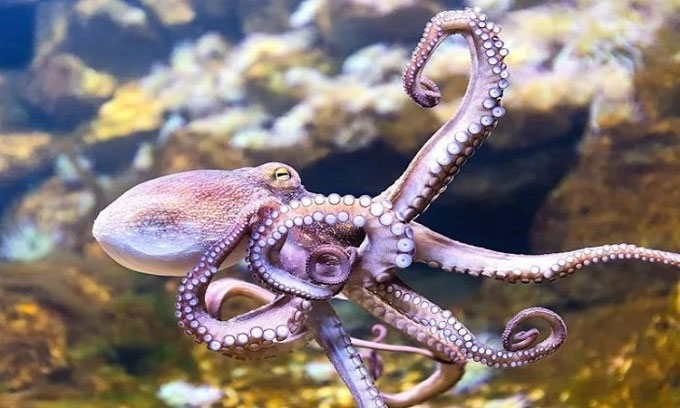The world’s first commercial octopus farm is set to begin operations, raising concerns among scientists and conservation experts.
Playing with a Pacific giant octopus is part of Stacey Tonkin’s job. When she lifts the lid of the tank containing the octopus named DJ (short for Davy Jones), the creature often darts out of its den and clings to the glass if it’s in a good mood. Octopuses live to about four years old, so at one year, DJ is comparable to a teenager.

Octopuses have the largest and most complex brains among invertebrates. (Photo: Yahoo)
Stacey is one of five managers at the Bristol Aquarium, and DJ reacts differently to each of them. The creature enjoys lying still and uses its tentacles to hold her hand. The staff feed the octopus clams and shrimp along with some fish and crab. Sometimes, they place food in dog toys to entice its tentacles, helping it practice hunting skills. Stacey notes that the octopus changes color depending on its mood. “When DJ is brown-orange, it’s active or playful. A mottled color means it’s curious and excited,” Stacey said.
The level of awareness that Stacey observes in the octopus is recognized in UK law through amendments to the Animal Welfare (Sentencing) Act. This change came after a group of experts conducted over 300 scientific experiments and concluded that octopuses are sentient beings. They found compelling scientific evidence that these creatures can experience joy, excitement, and happiness as well as pain, stress, and suffering. The research authors firmly believe that octopus farming is unfeasible and that the government should consider banning the importation of farmed octopuses in the future.
However, octopus is becoming an increasingly popular dish worldwide. In South Korea, the creature is sometimes eaten alive. The population of octopuses in the wild is gradually declining, and prices are rising. It is estimated that 350,000 tons of octopus are caught each year, which is ten times higher than in 1950. In this context, the race to discover the secrets of breeding octopuses in captivity has spanned decades. Breeding is challenging because larvae only eat live food and require a carefully controlled environment.
The multinational company Nueva Pescanova (NP) from Spain appears to have outpaced competitors in Mexico, Japan, and Australia to win the race. They announced plans to start marketing farmed octopus next summer and to sell it in 2023. Based on research from the Spanish Oceanographic Institute (Instituto Español de Oceanografía), NP is examining the reproductive behavior of common octopus (Octopus vulgaris). NP’s commercial farm will be located inland, near the port of Las Palmas in the Canary Islands, according to PortSEurope. The farm is expected to produce 3,000 tons of octopus per year, helping to reduce the number of octopuses caught in the wild. NP declined to disclose any details about the conditions for keeping octopuses, such as tank size, food, and methods of slaughter.
An international group of researchers argues that the plan is highly unethical and ecologically unsound. The organization Compassion in World Farming (CIWF) has written to the governments of several countries, including Spain, urging them to ban octopus farming. “This creature is fascinating. They live solitary lives and are very intelligent. Therefore, placing them in empty tanks without cognitive stimulation is wrong,” emphasized Elena Lara, CIWF’s research manager.
Octopuses have complex, large brains. Their intelligence has been demonstrated in numerous scientific experiments. Researchers have observed them using coconut shells and seashells for hiding and self-defense. At the same time, they can learn to solve tasks very quickly. Octopuses also have the ability to escape from aquariums and steal bait from fishermen’s traps. They lack protective exoskeletons and have a high territorial instinct. Therefore, they are very vulnerable in captivity. If there is more than one octopus in the tank, they may cannibalize each other.
If the octopus farm opens in Spain, the captive individuals will not be protected by European law. Octopuses and many other invertebrate animals are considered sentient beings, but European animal welfare laws for farmed animals only apply to vertebrates.
NP argues that seafood farming is a measure to reduce pressure on fish catches, ensuring sustainable, safe, and healthy resources that support fisheries. However, Lara contends that NP’s activities are purely for commercial purposes. The company’s farming operations will not stop fishermen from catching octopuses. According to Lara, octopus farming may increase pressure on wild fish stocks. Octopuses are predators and require food amounts 2 to 3 times their body weight to survive. Currently, about one-third of the fish caught worldwide is used as feed for other animals. Therefore, farmed octopuses may consume feed from already overexploited fish stocks.

















































